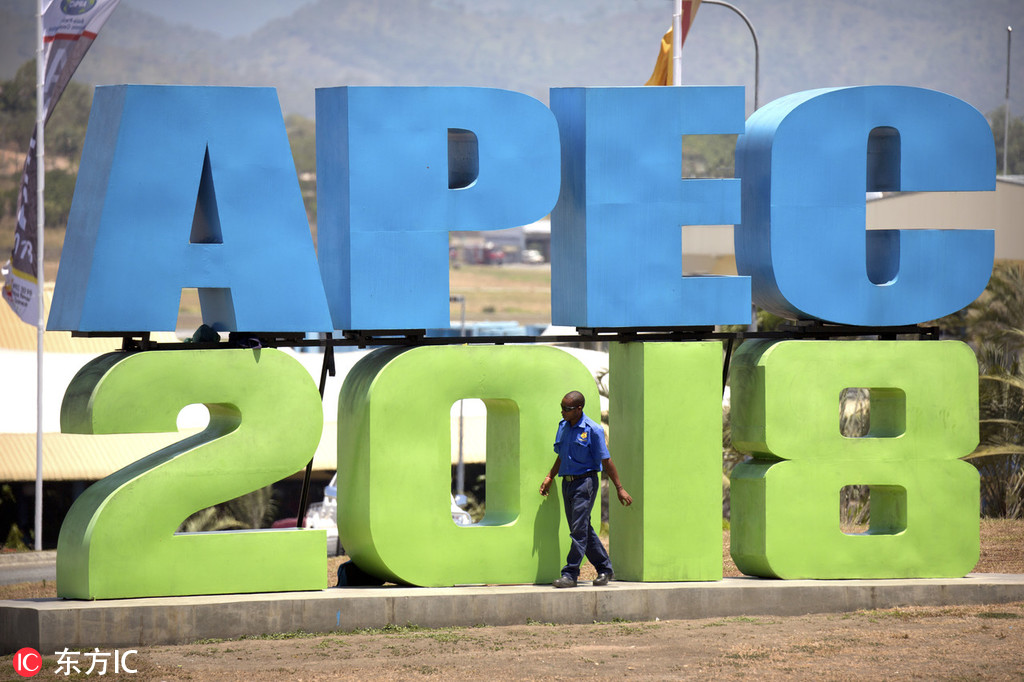Asia-Pacific building a shared future


Addressing the Asia-Pacific Economic Cooperation meeting in Port Moresby, Papua New Guinea, on Sunday, President Xi Jinping sent a strong message that China remains committed to deepening reform and opening-up further, and hopes to work with other APEC members to promote inclusive development in the Asia-Pacific region and explore new areas of digital economic development.
Emphasizing that China will help promote regional economic integration and build an open economy in the Asia-Pacific, Xi said China's determination to support free and open trade and voluntarily open its market to the world will not waver. In fact, the past 40 years show that reform and opening-up bring progress to a country while self-isolation leads to backwardness.
From becoming rich to becoming strong
Socialism with Chinese characteristics may have entered a new era in China now. But in modern history, China experienced many hardships. Now China has transformed as a country-from "standing up" and, through hard work, becoming rich, it has now embarked on a journey to become strong.
Xi urged the APEC members to advance regional integration, so as to build an open economy in the Asia-Pacific. APEC was established in 1989, and since then its member economies, through reform and opening-up and further integration into the global value and industrial chains, have not only realized a relatively free flow of goods and services within the region, but also boosted capital and technology exchanges with nonregional economies and thus helped better allocate resources. In the process, they not only propelled their own economic development, but also promoted regional economic integration.
Since China joined APEC in the early 1990s, it has made remarkable contributions to the economic development of other members while opening a new era for its own development in the Asia-Pacific, as indicated by its more than 30 percent annual contribution to world economic growth in recent years. China has injected a strong impetus into the economic development of the Asia-Pacific, becoming the most important or largest trading partner and source of investment for many economies in the region.
China will unswervingly deepen reform in an all-round way, accelerate the improvement of the socialist market economic system and the building of a modernized economic system, apart from making efforts to firmly defend the rules-based multilateral trading system, oppose unilateralism and protectionism, push the Asia-Pacific economy to develop in the right direction and promote common prosperity in the region.
Second, President Xi also said that China will further drive innovation in the region and foster new drivers of growth. In recent years, new technologies, represented by the digital economy, have been emerging, becoming a new force for global and regional economic development in the future. And the new economic model will create new and more opportunities for the world economy.
But since uncertainties and destabilizing factors have been on the rise in the Asia-Pacific and many other parts of the world, all countries should actively cultivate new economic growth points. New technologies such as the internet and artificial intelligence are transforming production systems and lifestyle, reducing transaction costs and improving total factor productivity.
Need to strengthen digital economy
This means innovative development is the trend of the times. And accordingly, the APEC meeting called for the full and balanced implementation of the internet and digital economy road map, while underscoring the need to strengthen digital infrastructure and capacity building to unleash the growth potential of the digital economy. While promoting "a digital China", Beijing is taking advantage of Internet Plus and other innovations to transform its business and economic governance model-make it more efficient and effective-and inject a strong new impetus into the Asia-Pacific economy.
Third, Xi intimated the other participants in the APEC meeting that China will make more efforts to further improve connectivity, and promote inclusive development in the Asia-Pacific.
In fact, China has always attached great importance to building infrastructure and improving connectivity, especially since Xi proposed the Belt and Road Initiative in 2013. But the work of building infrastructure and improving connectivity has entered a new development stage. And China, together with other economies, will continue to adhere to the principles of "consultation, joint construction and sharing" and vigorously promote the Belt and Road Initiative to create greater opportunities for all the people, especially people in the Asia-Pacific, to achieve inclusive and interconnected development.
And fourth, Xi delivered a message that China will further deepen its partnership with APEC members and work with them to address common challenges. In recent years, the Asia-Pacific has seen the booming development of multilateral mechanisms, such as the Association of Southeast Asian Nations and China, Japan and the Republic of Korea (10+3), the Pacific Alliance and Regional Comprehensive Economic Partnership, and the establishment of many free trade areas.
US using disruptive trade policies
However, the United States has accelerated its pursuit of unilateralism, struck a trade pact with Mexico and Canada to replace the North American Free Trade Agreement, and withdrawn from the Trans-Pacific Partnership agreement. And the Japan-led Comprehensive and Progressive Trans-Pacific Partnership is expected to be finalized. These factors, along with the different development stages and national conditions of the Asia-Pacific economies, will exacerbate the divergences among them in various areas.
The successes achieved by APEC over the past three decades show that only by deepening cooperation can the APEC economies properly handle their differences and effectively address common challenges. In 2014, China hosted the APEC meeting, achieving many important results, the most important being the agreement to launch the Free Trade Area of the Asia-Pacific process.
Adhering to the new development concept of "innovation, coordinated, green, open and sharing", China is shifting from high-speed growth to high-quality development, which will create new drivers of cooperation and development for the Asia-Pacific economy and help lead the region toward a brighter future by building a community of shared future.
The author is a research fellow at the international finance center affiliated to the Ministry of Finance.


































